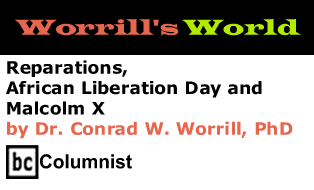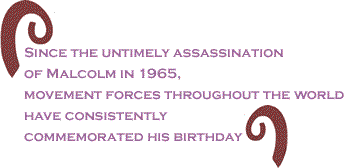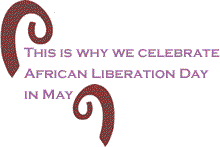
|
|||||||||||||||||||||
|
The current issue is always free to all readers If
you need the access available to a |
|
 |
|
The Reparations Movement is intensifying throughout the African World Community. Increasingly, the masses of African people in America, Africa, and the Caribbean are actively supporting the demand for reparations as a vehicle to seek repair for the damages inflicted upon African people in the past and their continuing vestiges. It is in this spirit that African people worldwide celebrate African Liberation Day and Malcolm X’s Birthday during the month of May. The celebration of African Liberation Day (ALD) in the United States began in May 1972, in Washington, D.C. More than 60,000 people participated in this historic event. Since the untimely assassination of Malcolm in 1965, movement forces throughout the world have consistently commemorated his birthday. Malcolm X was born on May 19, 1925 in Omaha, Nebraska. From the 1980s through 1997, NBUF (National Black United Front) Chicago Chapter sponsored African Liberation Day / ALD on the Westside, where we marched down Madison Street and culminated with a rally and cultural program in Garfield Park. These ALD events have been very successful and we have been honored to sponsor them. Other groups are now sponsoring African Liberation Day celebrations and activities throughout the United States. African Liberation Day has become an institution throughout the African world. It is a day when all people of African ancestry should come together. Whether you were born in Ghana, Nigeria, Liberia, Kenya, Ethiopia, South Africa, Mozambique, Zimbabwe, Haiti, Jamaica, Mississippi, Alabama, Georgia, Belize, Bahia, Canada, Cuba, Trinidad, Puerto Rico, Paris, or Chicago, as long as you are Black, you are an African, with a common heritage, and a common set of conditions.
As we prepare to participate in the upcoming weekend of events and activities, we must always remember the origin and development of African Liberation Day. Our ancestor, Kwame Ture, explained, “ALD was founded by Kwame Nkrumah on the occasion of the First Conference of Independent States held in Accra, Ghana and attended by eight independent states. The 15th of April was declared African Freedom Day to mark each year, the onward process of the liberation movement, and to symbolize the determination of the people of Africa to free themselves from foreign domination and exploitation.” Further, the AAPRP (All-African People’s Revolutionary Party) points out that, “On the 25th of May 1963, 31 African heads of state convened a summit meeting to found the Organization of African Unity. They proclaimed May 25th as ALD and called for mass demonstrations and manifestations in every comer of Africa and the African Diaspora.” The idea of ALD has its origins in the long history of African people to break free of the yoke of European domination and white supremacy. This is a time in which we emphasize our oneness as a people with a common past, common set of problems, and a common future. The capturing of millions of African people, who were placed in slavery and introduced into the western hemisphere as property and commodities, is the backdrop upon which we commemorate African Liberation Day.
It was the slave trade industry of the fifteenth, sixteenth, and seventeenth centuries, involving Britain, France, Portugal, Spain, Belgium, and Germany, that served as the foundation for these western powers and provided them the margin of profit in getting the greatest return from their investment. The western world still seeks to keep Africa and African people worldwide in bondage, so they can continue to maximize the greatest return from their initial investment. After chattel slavery was abolished in England and the United States, the slave trade industry began to wind down. The former slave-trading nations found themselves no longer needing slaves, but then stumbled upon the other natural resources of Africa. They began to fight each other over the gold, diamonds, and other mineral and plant resources they were discovering. This resulted in the calling of the Berlin Conference
in 1884, wherein the European powers united to divide the continent
of Africa among themselves. It has been discussed, historically,
that those who control Africa, control the world. Therefore, the
Berlin Conference was a crowning blow in African history. The
results of this conference led to the carving up of Africa so
that France, Britain, Portugal, Spain, Belgium, and Germany controlled
separate territories throughout the continent. This became known
as the colonial period in African history. The colonial period
in Africa, just as with the enslavement of African people captured
and brought to North America, had a devastating impact on Africa
and African people. It was not until the early 1950s that the
first African country gained political independence in the movement
to reclaim Africa. That country was Ghana under the leadership
of Kwame Nkrumah, who led the Ghanaian people in their fight against
British colonialism.
African people began waging a battle to reclaim their lands. This has been a long and bitter struggle. Resistance to white supremacy and colonial domination took many shapes and forms. The Pan African meetings (1900-1945) provided a mechanism for a small group of African leaders to plan and plot strategy for African freedom. The Garvey Movement of the 1920s brought the idea of African freedom and independence to the masses of our people around the world. “Africa for the Africans – At Home and Abroad,” was a slogan that captured the spirit of African people. This slogan gave a clear understanding of who we are as a people and what we should be struggling for. It was not until the early 1950s that the first African country gained political independence in the movement to reclaim Africa. That country was Ghana, under the leadership of Kwame Nkrumah, who led the Ghanaian people to their fight against British colonialism. Shortly after this successful defeat of the British, Sekou Toure led the people of Guinea toward their independence from French colonialism. Right on the heels of this victory was the victory of Patrice Lumumba and the people of the Congo, who won the battle, for a brief moment, against Belgium. This independence movement sparked an onslaught of African people reclaiming their territories and led to the formation of the Organization of African Unity (OAU) in May 1963. This is why we celebrate ALD in May. It was during this period that Malcolm X linked the struggle of African people in this country with the struggle of African people worldwide. It is interesting to note that the Civil Rights Movement in this country was sparked in Montgomery (1955) at approximately the same time the independence movement in Africa began (1956-57). The call for Black Power (1966) sparked a discussion in the Black Liberation Movement in America that placed the re-identification with Africa and African people on the Movement’s agenda, once again. This renewed a new phase of the Pan African Movement.
The call for support of our brothers and sisters fighting against the Portuguese in Angola, Mozambique, and Guinea Bissau led to the formation of African Liberation Day, held in the country on May 27, 1972 and attracting over 60,000 African people. African Liberation Day has become an institution in America since that time. We must continue to fight against racism and white supremacy as we demand reparations for African people in America and worldwide. ALD and Malcolm X’s Birthday Commemoration and activities should serve as a catalyst for our continued building of the Reparations Movement in America. The Reparations Demands will become our “Shining Star!” BC columnist Conrad W. Worrill, PhD, is the National Chairman of the National Black United Front (NBUF). Click here to contact Dr. Worrill. |
|
| Home | |
| May
24, 2007 Issue 231 |
||||||||||||||
|
||||||||||||||
| Printer Friendly Version in resizeable plain text format | ||||||||||||||
|
|
||||||||||||||
 |
||||||||||||||
 |
||||||||||||||
 |
||||||||||||||
| |
||||||||||||||
| |
||||||||||||||






































